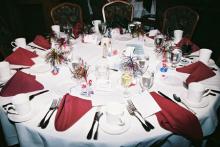I love tables. Big, high tables packed tight with chairs, round or square, it doesn't matter. Tables are amazing because they're socially brutal. Consider this, for a moment: A table is a setup that forces a person to face one direction for however long he or she sits, often staring directly at another person who is also forced to face in one direction. Turning away from whomever one is facing just results in making eye contact with a different, similarly stranded person. Isn't that a delightful arrangement? Seriously, people being nailed down, unable to make decent excuses to run away, compelled by the fear of supreme awkwardness to pursue conversation. This is why tables are some of the most honest places in society. Try as one might, personal affectations and little gestures of etiquette can't help but fail under such constant pressure. People sitting around a table for an extended period of time put their true character on display, whether they like it or not. Thus why liquor and wine come in large bottles.
Though I do genuinely love the ego-crushing power of a sober table, there's even more value in a well lubricated one. All good dinner parties devolve into a group of people leaning elbows-first on a stained tablecloth with wine pouring like intermittent storms. Yes, wine really is the best drink for this scenario because no one, not a single person in human history, can control wine. Unlike liquor, which is potent and easy to doll out in doses like medicine, and beer, which takes up enough space in the stomach to have very real volumetric limits, wine is too much like food to be totally understood. It both intertwines with appetite and tempts independent of it. Wine gets people drunk slowly but steadily, the sharp spikes and sudden mood swings of harder stuff almost entirely absent from the gradual descent into sentimentality and confession.
And that's the core of wine around a table. There is nothing in this world more cathartic than telling the truth, especially when you've been keeping it pent up for a long time. That's why the Romans had their saying about truth and wine. As the alcohol inhibits the speed of thought and the nerves cease to process the full extent of pain, wine soothes the mood with the assurance that the body is well fed, warm and maybe, in some roundabout way, prosperous. Thoughts our sober minds work hard to smother start requiring more effort than we're willing to make to shackle. With softened, sweetened and unleashed tongues, we let ourselves say those things we'd never say in the psychological shell of sobriety.
But it's the table that makes it so damn good. That social pressure, being forced to make eye contact with others, drives us to drink, but the drinking drives us to confess the truth. After so many bottles get uncorked, everyone has already lost their pretenses to the constant scrutiny of the table. In a perfect storm of defense mechanism dissolve, the wine-drunk folks around the table are more themselves than they'll ever be otherwise.
And yes, tomorrow when that sugar-and-sulfide headache blooms and the recollection of all those confessions breaks through the haze, there will be regret. But it's too late, right? Confessions, like wine, can't be put back in the bottle once past the lips. Try and you'll just embarrass yourself and make a mess.
